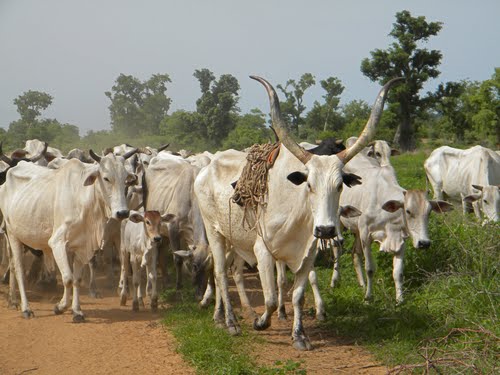There are no products in your shopping cart.
| 0 Items | £0.00 |

 GOVERNOR Abubakar Bello of Niger State set aside 44,000 hectares of land to develop Nigeria's largest cattle colony under an ambitious plan to open 23 grazing reserves in a bid to address the ongoing menace of Fulani cattle herdsmen and boost meat production.
GOVERNOR Abubakar Bello of Niger State set aside 44,000 hectares of land to develop Nigeria's largest cattle colony under an ambitious plan to open 23 grazing reserves in a bid to address the ongoing menace of Fulani cattle herdsmen and boost meat production.
Over recent months, the political temperature in Nigeria has risen substantially after it emerged the federal government proposed that states make land available to Fulani cattle herdsmen to allow them create livestock colonies. Coming against a background whereby Fulani cattle herdsmen have carried out numerous murderous attacks against farming communities, the move has created tension across the country.
Within the last five or so years, heavily armed herdsmen have been attacking villages, particularly in the Middle Belt, murdering thousands of innocent villagers. Several state governors have suggested that herdsmen should establish private ranches to raise their livestock, to end the practise of them marching their animals across the country along grazing routes.
Increasing the political temperature over the last few weeks, the federal government's plans to introduce grazing reserves in all 36 states have been met with fierce opposition. However, the Kano and Borno state governments have waded into the crisis, offering land to herdsmen who want to open ranches.
Governor Abdullahi Ganduje of Kano State has set up a 16-man committee to establish Ruga settlements while cattle ranches can be built. Under his programme, these settlements will have added infrastructures such as schools, hospitals, livestock clinic, houses, markets and social amenities that would make life comfortable for their inhabitants.
Earlier this week, Governor Babagana Zulum of Borno State has also waded into the crisis, offering to made the Sambisa Forest available as a cattle colony. Under his plan, six local government areas in Borno State, including Konduga, Bama, Gwoza, Chibok, Damboa and Askira/Uba, will be set aside for ranches and the state government will deploy agro rangers, vigilantes and hunters to protect farmers and herders.
Now, Governor Bello has come up with a more ambitious plan involving a total of 44,000 hectares of land for 23 grazing reserves in Niger State. Of this total, 14,000 hectares will be in Iri village in Rijau Local Government Area and another 30,000 hectares will be located in Kampani Bobi in Mariga Local Government Area of the state.
Over recent weeks, Governor Bello has held frequent meetings with the Central Bank of Nigeria in a bid to secure funding for his plans. Also, the Niger State government has been talking to a body known as National Sheep and Goat Development, with a view to getting it to set up shop in the state too.
Governor Bello said Niger State remains one of the first states to put a structure on ground as it has acquired land in some local government areas for goat and sheep rearing scheme. However, the steps have not gone without a protest, as non- governmental organisation (NGO) Schools for Africa Working for Peaceful Co-existence Between the Fulani Herdsmen and Their Host Communities, has raised some concerns.
Its director Reverend Phyllis Sortor, said that a greater part of the grazing reserve has been encroached on by farmers. She added this might negate the idea of establishing the grazing land and subsequently lead to avoidable clashes between the Fulani herdsmen and the farmers.
According to Reverend Sortor, up to 90% of the 30,350 hectares of the grazing reserve has been encroached on and that this has subsequently forced the herdsmen to move over 1,000 cows out of the area to the eastern parts of the country. She however, promised the state government that her NGO would provide teachers, medical intervention, promote household training and support teams on the reserve when it is up and running.